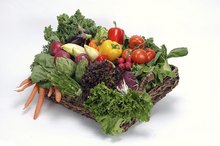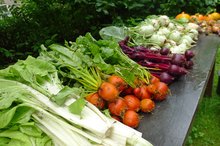What does fact checked mean?
At Healthfully, we strive to deliver objective content that is accurate and up-to-date. Our team periodically reviews articles in order to ensure content quality. The sources cited below consist of evidence from peer-reviewed journals, prominent medical organizations, academic associations, and government data.
- Human and Experimental Toxicology: The Effect of Brassica Vegetable Consumption on Caffeine Metabolism in Humans
- Human and Experimental Toxicology: The Effect of Brassica Vegetable Consumption on Caffeine Metabolism in Humans
The information contained on this site is for informational purposes only, and should not be used as a substitute for the advice of a professional health care provider. Please check with the appropriate physician regarding health questions and concerns. Although we strive to deliver accurate and up-to-date information, no guarantee to that effect is made.
Is There Caffeine in Vegetables?
Coffee is the most common source of caffeine in the American diet. Tea and chocolate also contain some of this addictive substance that can provide boosts in energy and mood. Although some plants contain caffeine in their leaves, none of these is a plant you eat as a vegetable.
Significance
If you are trying to cut back on caffeine, you may be concerned about hidden sources. You also may be allergic to the substance and want to prevent an accidental intake. Pregnant women should also monitor their caffeine intake -- keeping it to just 150 to 300 milligrams daily, the American Pregnancy Organization says.
Sources
Do Vegetables Cause Diarrhea?
Learn More
Coffee beans, tea leaves and cacao beans contain naturally occurring caffeine. Guarana is not a vegetable but a climbing plant related to maple trees. Its large leaves and berries, which are the size of coffee beans, contain about twice the amount of caffeine as coffee beans. The berries are considered a fruit, not a vegetable, and usually are included as an ingredient in juices, breads and sodas. Yaupon holly is another plant that produces a large amount of caffeine. You can make a drink from the leaves of this tree, but it is not common nor is it eaten like a vegetable.
- Coffee beans, tea leaves and cacao beans contain naturally occurring caffeine.
- Its large leaves and berries, which are the size of coffee beans, contain about twice the amount of caffeine as coffee beans.
Brassica Vegetables
While Brasicca vegetables do not contain caffeine, consuming them can affect absorption. A May 1992 study in the journal “Human and Experimental Toxicology” found that vegetables in the Brassica family can stimulate caffeine metabolism 1. Brassica family vegetables include cabbage, brussels sprouts and broccoli. Researchers guess that your intestines increase in permeability after consuming these vegetables, making them absorb caffeine at a faster rate.
- While Brasicca vegetables do not contain caffeine, consuming them can affect absorption.
Apiaceous Vegetables
Essential Amino Acids in Vegetables
Learn More
Eating cabbage may heighten the effects of caffeine on your body, while consuming carrots or parsley may decrease these effects. A 2000 issue of “Carcinogenesis” confirmed the findings that suggest Brassica vegetables increase caffeine sensitivity, but also found that consuming vegetables from the apiaceous family decreased sensitivity. Celery, fennel, dill and parsnips are other vegetables in this family.
- Eating cabbage may heighten the effects of caffeine on your body, while consuming carrots or parsley may decrease these effects.
- A 2000 issue of “Carcinogenesis” confirmed the findings that suggest Brassica vegetables increase caffeine sensitivity, but also found that consuming vegetables from the apiaceous family decreased sensitivity.
Related Articles
References
- Human and Experimental Toxicology: The Effect of Brassica Vegetable Consumption on Caffeine Metabolism in Humans
- Drugs.com: Guarana
- Meredith SE, Juliano LM, Hughes JR, Griffiths RR. Caffeine Use Disorder: A Comprehensive Review and Research Agenda. J Caffeine Res. 2013;3(3):114-130. doi:10.1089/jcr.2013.0016
- Richards G, Smith AP. A Review of Energy Drinks and Mental Health, with a Focus on Stress, Anxiety, and Depression. J Caffeine Res. 2016;6(2):49-63. doi:10.1089/jcr.2015.0033
- Brunyé TT, Mahoney CR, Rapp DN, Ditman T, Taylor HA. Caffeine enhances real-world language processing: evidence from a proofreading task. J Exp Psychol Appl. 2012;18(1):95-108. doi:10.1037/a0025851
- Koppelstaetter F, Poeppel TD, Siedentopf CM, et al. Caffeine and cognition in functional magnetic resonance imaging. J Alzheimers Dis. 2010;20 Suppl 1:S71-84. doi:10.3233/JAD-2010-1417
- Harrell PT, Juliano LM. Caffeine expectancies influence the subjective and behavioral effects of caffeine. Psychopharmacology (Berl). 2009;207(2):335-42. doi:10.1007/s00213-009-1658-5
- Lucas M, O'reilly EJ, Pan A, et al. Coffee, caffeine, and risk of completed suicide: results from three prospective cohorts of American adults. World J Biol Psychiatry. 2014;15(5):377-86. doi:10.3109/15622975.2013.795243
- Abdel-Hady H, Nasef N, Shabaan AE, Nour I. Caffeine therapy in preterm infants. World J Clin Pediatr. 2015;4(4):81-93. doi:10.5409/wjcp.v4.i4.81
- American Psychiatric Association. Diagnostic and Statistical Manual of Mental Disorders. 5th edition. Washington DC; 2013.
- Turnbull D, Rodricks JV, Mariano GF, Chowdhury F. Caffeine and cardiovascular health. Regul Toxicol Pharmacol. 2017;89:165-185. doi:10.1016/j.yrtph.2017.07.025
- Centers for Disease Control and Prevention. Alcohol and Caffeine. Updated October 23, 2018.
- Alsunni AA. Energy Drink Consumption: Beneficial and Adverse Health Effects. Int J Health Sci (Qassim). 2015;9(4):468-474.
- Lyngsø J, Ramlau-Hansen CH, Bay B, Ingerslev HJ, Hulman A, Kesmodel US. Association between coffee or caffeine consumption and fecundity and fertility: a systematic review and dose-response meta-analysis. Clin Epidemiol. 2017;9:699-719. doi:10.2147/CLEP.S146496
- U.S. Food and Drug Administration. Pure and Highly Concentrated Caffeine. Updated September 21, 2018.
- National Institute on Drug Abuse. Drugs, Brains, and Behavior: The Science of Addiction. Updated July 2018.
Writer Bio
Andrea Boldt has been in the fitness industry for more than 20 years. A personal trainer, run coach, group fitness instructor and master yoga teacher, she also holds certifications in holistic and fitness nutrition.









